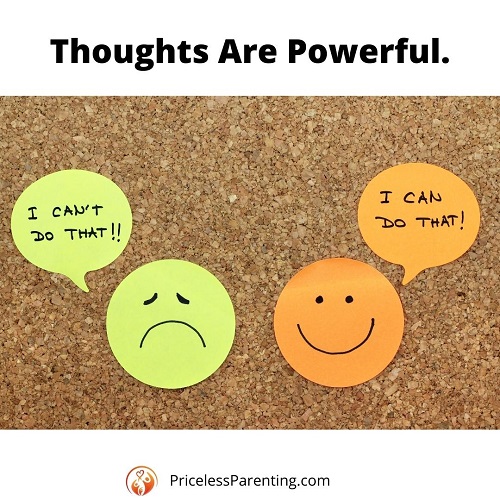Changing Your Children's Thinking from Negative to Positive
by Kathy Slattengren, M. Ed., Priceless Parenting (sign up for monthly parenting newsletter and receive 20+ printable charts for kids and parents)
(listen to article read by the author)

Who will criticize your children the most as they grow up? They will! It is their own negative self-talk that they will hear most often.
Everyone’s mind produces a steady stream of thoughts. When these thoughts turn negative, fear, doubt and frustration quickly sets in. Stopping negative thoughts isn’t easy and it starts with actually noticing those thoughts.
What are your kids saying to themselves?
What your children say out loud gives you insight into what they are thinking. You know they are engaging in negative self-talk when you hear things like:
- “I’m never going to get this!”
- “Nobody likes me.”
- “I can’t do it!”
Whether our children are struggling with school work, relationships or athletics, their thoughts can help or hinder them.
For example, suppose your children repeatedly tell themselves “This math assignment is so hard I’ll never finish it.” How do you think those thoughts effect the likelihood that they will finish the math assignment?
Dr. Alison Arnold came to my daughter’s gymnastics center to work with the kids on the mental side of gymnastics. Like so many athletes, gymnasts need to be in control of their thoughts if they are to give their best performance.
Negative thoughts like these wreck havoc on a gymnast’s routine:
- “I’m going to mess up.”
- “She’s so much better than me.”
- “This is too hard for me.”
When negative thinking takes over, the likelihood of getting injured is increased. You definitely do not want your daughter having negative thoughts right before she does a backhand spring on the beam!

How can you help your children change their self-talk from negative to positive?
There is a Zen concept called the Monkey Mind. It’s the part of your brain that races from one idea to the next, chattering endlessly, craving things, being unsatisfied and judgmental. Dr. Arnold used this concept to explain negative thinking to the kids. Negative thoughts are like a naughty monkey running away instead of focusing on the task at hand.
What can you do once you notice your Monkey Mind is off in the weeds? You need to flip your negative thinking.
Dr. Arnold discussed a three step process for flipping negative thinking:
- Take a deep breath.
- Think to yourself “Stop. Relax.”
- Say something positive to yourself like “I can handle this.” or “I am strong.”
By following this process, kids learn how to stop their negative thoughts and replace them with positive ones. You
can print out a
positive thinking chart to help your kids remember these ideas.
What are you saying to yourself about your kids?
It’s every bit as important to watch out for your own negative thoughts. One of the worst patterns parents can get into is continually thinking about their children’s faults.
One mom of three children complained she couldn’t stop thinking about how they really weren’t measuring up like she had hoped. Despite her children’s many achievements, she struggled to control her negative thoughts. This led to nagging them, lecturing them and pointing out where they needed to improve. Her negative thoughts and words led to both her kids and herself feeling worse.
What you say to your children has a big impact on them. By making more positive comments, you can help them develop more positive self-talk. One way to do this is simply describing their positive behavior:
- “You sat down, got out your math book and started working on your homework.”
- “You shared the truck with your friend.”
- “You waited patiently for your turn to go down the slide.”
- “You helped set the table for dinner. I appreciate that.”
Practice making positive comments to your children every day. Your positive comments will help both you and your children focus on what’s right instead of what’s wrong. As your children spend more time thinking positively they’ll have less time for any negative thoughts!